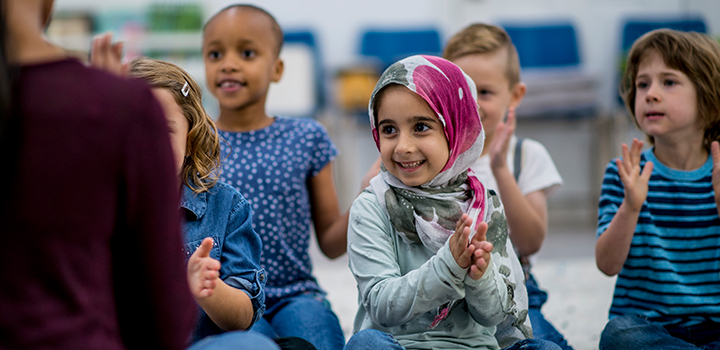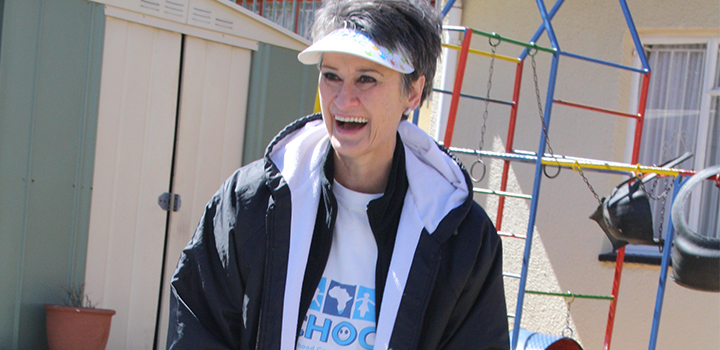Back to School: top tips for a child with cancer

A child’s cancer diagnosis can have a severe impact on their schooling. Adri Ludick has written the book on how to keep children with cancer on the academic track.
Listen to Adri Ludick share critical views on stabilising a child’s education during and after their cancer treatment here.
Adri Ludick, the Programme Development Manager at CHOC, Childhood Cancer Foundation SA, has devoted her life to teaching special-needs children. She’s also literally written the book on how cancer diagnoses affect children’s schooling – and how to respond effectively and lessen potential negative educational impacts. Her guide, called ‘Back to School’, is a gold-mine of information on how to adapt to the educational and associated challenges that cancer poses for parents, caregivers, siblings and fellow pupils.
“A cancer diagnosis can turn a family’s life upside down as everybody adapts to a child’s entirely new set of needs,” says Ludick. “Parenting roles change as one parent has to be in hospital for treatment support, another does the school run and other siblings almost inevitably get less attention, setting in motion an array of challenging dynamics.”

CHOC’s Adri Ludick is passionate about the educational needs of children with cancer.
Challenges faced by a child with cancer, returning to school
Besides giving practical every-day advice on how to help a learner battling cancer to keep up with the curriculum or adapt while in hospital, the book is a vital guideline and reference work for teachers, healthcare professionals and caregivers for when the cancer-affected child returns to the classroom. “The pitfalls and emotional challenges of re-integration for the child can be varied and intense, ranging from anxiety of being teased or labelled, a fear of no longer fitting in and/or trying to catch up on classwork,” says Ludick. “The issues that a child may face can range from having lost their hair through chemotherapy and wondering how they’ll be received by classmates, to feeling exhausted and more.”
“When I taught kids who were in hospital, I realised that a lot of teachers have children with cancer in their classrooms. Some teachers may even have fears about cancer because of their own past experiences or associations with cancer,” she adds. “I receive a lot of questions from teachers asking how to handle a child with cancer. These teachers work in a variety of schools. Some are at very rural or impoverished schools where a teacher has up to 60 children in a classroom and can hardly handle a returning child with special needs. Others are in better-off schools where teachers are are able to send us a child’s school work while they are in hospital, so that we can assist the child to continue their schoolwork remotely - or they are able to offer the child specialised help with subjects when the child returns to school,” she explains.
Hospital schools help maintain academic progress
Children with cancer and those receiving treatment usually have to ‘’grow up” quickly and often view life differently to their peers. When faced with what they’ve missed at school children may feel a sense of loss or anger and/or resentment towards their peers and even their siblings.
“And, siblings may be feeling very similar emotions prompted by getting less attention than usual,” says Ludick.
“It’s vital to acknowledge both a cancer-affected child’s feelings and their siblings’ emotions too, as without the right support or left to their own devices, they can act out or withdraw from their school environment. You need to keep the environment as “normal” as possible and maintain routine wherever possible.”
Hospital schools help hospitalised children regain and maintain academic progress and are accredited and run by the local public school system, with predominatly the same curriculum and testing – or as close to it as possible - given the individual circumstances of each child. The hospitalised child is often supported by volunteer teachers, trained CHOC volunteers, older siblings or family members, while some private hospitals even have “child life” specialists trained to help sick children.
Impacts of long-term hospitalisation on schooling and academic perfomance
A child’s schooling can be profoundly impacted by illnesses such as a brain tumour or leukaemia diagnosis. Then there’s the impact of the severity of disease and the effects of surgery, chemotherapy or radiation on the central nervous system. “If cancer develops at a very young age, the child may not yet have mastered basic skills. Fatigue and lack of energy also impact learning,” says Ludick. Central nervous system disorders can affect the rate and quality of cognitive information processing, attention-span, concentration, memory, abstract and visual-spatial abilities, planning and organisational skills and limit stamina. Some of these may manifest only after several years of treatment, others earlier. “Damage may not always be visible,” Ludick warns. “Neurological loss can also manifest as emotional and psychological problems.”
Reintegration to mainstream schooling can be tricky
Successful reintegration into a mainstream school after cancer treatement requires solid, regular communication between parents, teachers and healthcare professionals regarding progress and challenges. A hospital school needs to send an exit report to the mainstream school, which includes an independent eductional support programme which the mainstream school must use to develop a tailored remedial programme upon the child’s return. The overall purpose is to facility re-entry to mainstream schooling without loss of the educational programme – wherever possible.
Ludick says teachers should contact the parents immediately should any physical, emotional and behavioural changes be detected in the child. “And, its vital to educate a child’s peers about what cancer is, how it is treated and its side-effects, to avoid stigmatisation. This can include a visit to the school by a member of the paediatric oncology team to brief classmates, dispell myths and answer questions, while a visit from a long-term cancer survivor can also go far in sharing key information that children may want to know about life, hope and survivorship,” says Ludick.
“It’s really important to remember that a child with cancer is a normal child that is sick at a particular moment in time, but that has hope that they will get better and live a normal and healthy life.”
All medical information found on this website including content, graphics and images, is for educational and informational objectives only. Discovery Health publishes this content to help to empower cancer patients and their families by promoting a better understanding of a cancer diagnosis. The views expressed by all of the contributing healthcare providers are their independent, professional medical opinions, aimed at supporting patients. These views do not necessarily constitute the views of Discovery Health.
The Discovery Health Medical Scheme is an independent non-profit entity governed by the Medical Schemes Act, and regulated by the Council for Medical Schemes. It is administered by a separate company, Discovery Health (Pty) Ltd, an authorised financial services provider.
Related articles
The role of your oncology care physician
It’s normal to feel unsure and unsettled when your active treatment programme comes to an end and the ‘security blanket’ of your ever-present medical team is no longer a daily fixture. Now, your oncology care physician takes centre stage.
A normal part of every cancer journey is the rollercoaster ride of emotions that you experience including anxiety, fear and dread. When these feelings persist over time, intensify, or start affecting daily life, there could be signs of PTSD.
It's very common, once treatment ends, to find yourself feeling lost, insecure and unsure about 'where to next'. While every cancer journey is unique, there's one important aspect that's universal: cancer changes every patient's life.